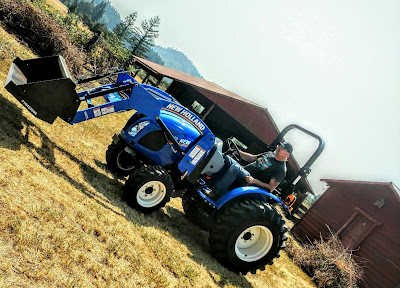It's speculated that humans have been using fire to cook food for at least 1.5 million years, presumably that's a lot of steaks! I realize the population over that period of time hasn't been close to modern day populations, but my imagination can easily see generations of some distant relative neanderthal family sitting around a fire with some meat on a spit. Evidence of animal husbandry dates back 15,000 years through the Neolithic period and continues to this day. That's why I'm fairly certain that meat is probably still a safe bet in our diet and even a necessity to good health. It's also the reason barbecues are so essential to family/friend gatherings.
Unfortunately, in recent years (the past few centuries) human success has lead to population growth that's far beyond a sustainable level, and traditional animal husbandry practices have turned into an ugly industrialized food supply system that's morally offensive and environmentally unfriendly. The vast majority of people now rely on grocery stores as their food source and are far removed from planting and growing of fruits and vegetable, and raising animals. A for-profit food industry stands between them and subsistence. This drastic change along with other human social influences have lead to over consumption, unhealthy diets, a rise in food allergies, and disdain for the food industry itself.
It's easy to see why more people are looking at vegetarian diets as a solution to health and food safety. With a growing number of case studies and scientific research focused on demonstrating meat is bad and veggies are good one only needs to accept human over-population as our future to agree. Sadly, over-population is an issue that won't be addressed or going away any time soon, it will get a lot worse before it gets better. So the anti-meat movement will likely get stronger and those of us that appreciate meat in our diet will be further branded as neanderthals living in the past. Google searches are already biased and when searching for "why meat protein is better for you" the top results displayed are opinion pieces siting studies that imply strictly vegetarian diets are better for you.
The real problem with studies that have identified meat as being "less healthy" is that the underlying health risk isn't the meat, it's actually sodium and nitrates that are used in meat processing. These studies don't make that point clear enough and the general overall message delivered is to avoid meat. It's the curing salts, smoking, and other preservatives that lead to the associated health risks, along with poor eating habits in general for those that enjoy excess processed foods. It seems our greatest health risks come from processed foods, which is one of the biggest reasons here on the farm we're working hard to preserve our own foods, including meat products.
The reality is, and it's evidence based, vegetable proteins aren't complete and lack a number of amino acids and simply don't fulfill the human body's needs. Even plants that have been identified as having more proteins still fall short. Plants also lack many of the accompanying important nutrients, such as: zinc, vitamin D, vitamin B12, and omega-3. The bottom line is meat has an important role in human diet and thousands of years of evolution has established that. Here on the farm we're going to continue appreciating meat in our diet for our health and well-being, and we'll do our best to raise our animals responsibly and as environmentally friendly as we can. It will likely be cooked and/or cured and served alongside a variety of vegetables and fruit.
References -
1. Mark, Joshua J (2010), Ancient Animal Husbandry, Ancient History Encyclopedia.
2. Brown (PhD, RD), Mary Jane (2017), Animal vs Plant Protein - What's the Difference?, Healthline.com.









